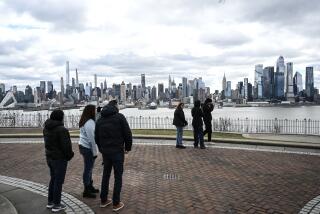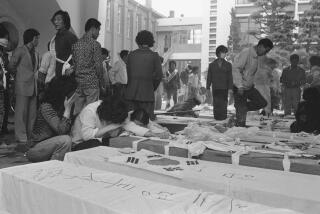After Boycott, Sunnis Knock on Back Door
Sunni Muslim political and religious leaders who led a boycott of the Iraqi national election Sunday are now signaling a desire to engage in the political process and help write the country’s new constitution.
The new stance may represent a turning point in efforts to involve Iraq’s Sunni minority, which dominated the country during Saddam Hussein’s regime and whose opposition to the new political order has fueled the violent insurgency and threatened prolonged instability.
The shift was in evidence Friday at Baghdad’s Umm Qura mosque, headquarters of the hard-line Muslim Scholars Assn. After the prayers, a government official was permitted to issue a call for Sunni participation in future electoral rounds.
“We ask you to participate in the next elections,” said Adnan Mohammed Salman, a spokesman for the Ministry of Religious Endowments, which oversees the country’s mosques. “We must prepare and unite our ranks.”
By allowing such a statement to be issued at the mosque, Sunni leaders apparently are acknowledging that the best way to protect their community’s interests is through participation in the political process.
Shiite Muslims make up the majority of Iraq’s population, but were oppressed for decades under Hussein. Their leaders encouraged them to vote, leading to a high turnout, and the top Shiite slate, the United Iraqi Alliance, is ahead in early returns.
But Sunni Arabs, having lost their favored position with Hussein’s ouster, feel threatened by the rising ambitions of the Shiite Arabs and the Kurds, an ethnic minority concentrated in the country’s north.
Salman sought to reassure Sunnis that they were a critical part of Iraq, saying they had “participated in the building and the defending of our beloved country.”
“There is no power that can erase us or our role in this country,” he said.
After leading the Friday prayers, the imam at Umm Qura, Sheik Ahmed Abdel Ghafour, called journalists back into the mosque to hear Salman, and stood silently at his side has he delivered his message. Ghafour did not comment on the statement and the crowd of worshippers listened quietly. Salman has spoken at the mosque before, and occasionally been met with jeers.
After more than a year of implacable opposition to the interim Iraqi government, groups such as the Muslim Scholars Assn. must tread carefully to avoid alienating supporters by appearing to reverse course.
The association seems to be cultivating a middle ground, said other Sunni politicians, by developing an arm’s-length relationship with the government and trying to secure a role in the writing of the constitution, a task that has been given to the national assembly.
The transitional assembly also will form a caretaker government that will rule until the permanent constitution is written and ratified in a national referendum. A new round of elections, scheduled for December, will choose a more lasting Iraqi government.
Almost immediately after the election Sunday, the Muslim Scholars Assn. criticized the vote, saying it was illegitimate because of low turnout in many Sunni-dominated areas. Yet the association “probably will play a role in writing the constitution,” said Minister of Industry Hachim Hassani, a prominent Sunni who broke with the Iraqi Islamic Party when it withdrew from the government in protest of the assault on Fallouja last year.
“They said this government is not totally legitimate, but they’ll accept it,” Hassani said. “They can deal with this government, and that’s good enough for now.”
Preliminary figures showed that in Sunni-dominated areas such as Al Anbar province, which has been racked by insurgent violence, only about 17,000 of as many as 250,000 eligible voters took part in the election.
Amid a general acknowledgment that Sunnis would not be fairly represented in the new assembly, negotiations are already underway to make up for that imbalance.
Ranking Sunni and Shiite politicians met Wednesday in the office of interim Prime Minister Iyad Allawi to discuss the issue. They included representatives of the Shiite United Iraqi Alliance, as well as prominent Sunni politicians such as Hassani, interim President Ghazi Ajil Yawer and the head of the Iraqi Islamic Party, Mohsen Abdel Hamid.
Hassani said the group agreed in principle that representatives of the Iraqi Islamic Party and possibly the Muslim Scholars Assn. should be included on the committee that will draft the constitution. Committee members will be selected by the national assembly, but don’t have to be from among the lawmakers. As a result, opposition groups such as the Muslim Scholars Assn. can get involved without endorsing the new government.
Other possible ways to include Sunnis have been floated, including granting them extra seats in the assembly or assigning specific government ministries to Sunni politicians. Hassani said such measures might prove impractical since the Iraqi Islamic Party wanted to maintain a distance from the new government to protect its opposition credentials.
“They think they’ll lose their credibility,” Hassani said. “They’re playing it very smartly. I think they’re planning for the next election.”
Some observers said the negotiations don’t necessarily signal an acknowledgment by Sunni leaders that the boycott tactic failed. Rather, it may have been the strategy all along.
An American official with an international organization working on Iraqi political party development speculated before the election that the boycotting groups had their eye on post-vote bargaining, which could bring them more influence than if they had run normally.
Another reason for the willingness to boycott may have been an understanding by Sunni politicians that Sunday’s vote -- to choose essentially another caretaker government -- wasn’t as important as the next electoral round.
The Iraqi Islamic Party has long held a more conciliatory position than the scholars group. It supported the U.S.-led invasion to oust Hussein, who is Sunni, and participated in the U.S.-appointed Iraqi Governing Council and, for a short time, in the interim government. When it withdrew from the elections late last year, party leaders made it clear that they remained committed to the nascent Iraqi political process.
For now, party officials have not committed to anything. A senior official said they were waiting to see what would be offered.
“Any proposal will be studied and considered,” said Assistant General Secretary Iyad Samarrai. “We didn’t withdraw from the political process. It’s not necessary to be in the government or the assembly to be part of the process.”
The scholars association has taken a harder line. The influential group has long held that any election would be illegitimate as long as U.S. soldiers remained in Iraq.
Recently, the group softened its demands for a firm timetable for the withdrawal of foreign troops. But it was rejected by both U.S. officials and many Iraqi politicians.
U.S. and Iraqi officials hope that bringing the Sunni political and religious leadership on board will finally blunt the insurgency.
Although a certain percentage of insurgents will never come around, Samarrai of the Iraqi Islamic Party said the majority could be coaxed into laying down their arms by an acceptable political solution.
“It all depends on the political process,” he said. “Part of the insurgency is against the whole process, but not all.... Many who are opposing, they are not opposing just because they want to die. There is a reason.”
More to Read
Start your day right
Sign up for Essential California for news, features and recommendations from the L.A. Times and beyond in your inbox six days a week.
You may occasionally receive promotional content from the Los Angeles Times.






